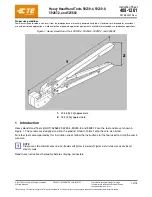
9
WWW.FORNEYIND.COM
d. any metal parts on the electrode holder, or MIG gun.
•
Do not weld in a damp area or come in contact with a moist or wet surface.
•
Do not attempt to weld if any part of clothing or body is wet.
•
Do not allow the welding equipment to come in contact with water or moisture.
•
Do not drag welding cables, MIG gun, or welder INPUT POWER CABLE through or allow them to come into contact
with water or moisture.
•
Do not touch welder, attempt to turn welder ON or OFF if any part of the body or clothing is moist or if you are in
physical contact with water or moisture.
•
Do not attempt to plug the welder into the power source if any part of body or clothing is moist, or if you are in
physical contact with water or moisture.
•
Do not connect ground clamp to electrical conduit, and do not weld on electrical conduit.
•
Do not alter INPUT POWER CABLE or plug in any way.
•
Do not attempt to plug the welder into the power source if the ground prong on INPUT POWER CABLE plug is bent
over, broken off, or missing.
•
Do not allow the welder to be connected to the power source or attempt to weld if the welder, welding cables,
welding site, or welder INPUT POWER CABLE are exposed to any form of atmospheric precipitation, or salt water
spray.
•
Do not carry coiled welding cables around shoulders, or any other part of the body, when they are plugged into the
welder.
•
Do not modify any wiring, ground connections, switches, or fuses in this welding equipment.
•
Wear welding gloves to help insulate hands from welding circuit.
•
Keep all liquid containers far enough away from the welder and work area so that if spilled, the liquid cannot
possibly come in contact with any part of the welder or electrical welding circuit.
•
Replace any cracked or damaged parts that are insulated or act as insulators such as welding cables, INPUT POWER
CABLE, or electrode holder immediately.
•
When not welding, cut wire back to contact tip or remove electrode from electrode holder
Noise
Noise can cause permanent hearing loss. Welding processes can cause noise levels that exceed safe limits. You must
protect your ears from loud noise to prevent permanent loss of hearing.
• To protect your hearing from loud noise, wear protective ear plugs and/or ear muffs.
• Noise levels should be measured to be sure the decibels (sound) do not exceed safe levels.
Additional Safety Information
For additional information concerning welding safety, refer to the standards listed at the beginning of this safety summary
and comply with them as applicable.










































